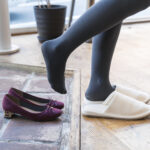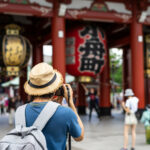When you’re visiting another part of the world, the last thing you want to do is offend the locals! However, the trouble is that what we find offensive may be entirely different from what other cultures find offensive.
Fear not, though, as we’ll help you prepare for your trip by revealing some of the things considered rude in Japan.
Touching the ground outside with your bare feet before entering a home
If you’re visiting friends or family in Japan, you should be aware that Japanese hosts typically expect you to take your shoes off before entering their home.
However, you should take your shoe off and then immediately step foot into their home (don’t allow your feet to touch the ground outside). If you do the latter, you’ll end up bringing dirt into their home, and this can appear disrespectful.
Don’t pour your own drink
If you’re socializing in Japan, you should refill everyone’s glass, but don’t refill your own. Once you have finished refilling, someone else on the table will fill your glass for you.
Furthermore, hold the bottle with both of your hands when pouring.
Never give and receive with the same hand
You should use both of your hands when giving and receiving things in Japan.
If you’re paying for something at a cafe or shop, there is usually a small tray next to the cash register where you place your money, rather than giving it straight to the cashier.
Avoid pouring soy sauce onto your rice
In Japan, you don’t pour soy sauce directly onto your rice. Rather, you pour it into a small dish that is provided precisely for this. You can then dip your sashimi or sushi into the soy.
Don’t point
As is the case in a lot of customs, pointing at things or people is deemed rude in Japan. Rather than pointing with your finger, use a gentle hand gesture to wave at what you want to indicate.
If someone is referring to themselves, they will typically touch their nose with their forefinger, rather than pointing at themselves.
Avoid making loud phone calls while on public transport
When in public, Japanese people are very discreet on their mobile phones. They keep their phone discussions as quiet and brief as possible.
This is not to say you won’t find people using their phones! Many will be busy watching videos with their headphones on or texting loved ones. However, phone calls are very rare, so do be mindful of this and take calls quietly when on public transport.
Don’t tip in Japan
In Japan, the locals take pride in their work, and they’re often offended if you attempt to tip them for their services. This is a complete contrast to the US where tipping is deemed mandatory.
However, in Japan, you’ll find service added to the bill at restaurants. So, if you try to leave some money, they’ll often try to give it back. Even taxi drivers will refuse the fare being rounded up.
Blowing your nose in public
If you blow your nose in public in Japan, you may get a few glances. If your nose starts to run, dash off to a private area or find a bathroom.
It’s also common to see people sporting face masks in public in Japan. Of course, this has become more common worldwide since the pandemic. However, during the winter time especially, a lot of locals wear masks because they don’t want to spread germs and infect others if they have a cold.
Eating on the go is not the norm in Japan
It may be the norm to eat or drink on the go while in America, but Japan does things differently! Fast food sold at stalls and street stands tends to be consumed standing up in a designated area, which is typically marked with lines on the pavement.
Most people do not eat or drink on public transport either, as it’s considered bad manners. The only exception to this is when you’re traveling on a long-distance train.
Skipping the queue
This is considered rude in a lot of cultures, and Japan is no different. However, it’s worth pointing out that Japan is a very organized and orderly place, so skipping the queue won’t go unnoticed, and it won’t be appreciated.
You’ll find single-file lines everywhere whenever waiting for something, be it a train, vending machine, or elevator.
When you’re waiting for a train, there are lines on the train station floor, which indicate where you should stand and wait for your train. When your train arrives, the door will open precisely between the two parallel lines. You can form an orderly queue here, ready to board the train once those leaving the train have departed.
Sticking your chopsticks into a bowl of rice vertically
When you’re eating a bowl of rice, your chopsticks should be rested across the bowl horizontally, or you can use the ceramic holder that’s provided.
One thing you shouldn’t do is stick the chopsticks into the rice vertically, where they will be popping out of the bowl. In Buddhism, this means you are offering your rice to the dead.
Mistreating business cards
Finally, if someone hands you a business card, you may feel tempted to decline it or shove it in your bag without giving it a second glance. This is considered extremely rude in Japan.
When someone hands you a business card, it’s deemed an extension of that person, and so you need to treat it with respect.
You should accept the card with both of your hands while looking at the other person. Make sure you look at the business card before you put it somewhere safe.
Treat the locals with respect while visiting Japan
So there you have it: some of the different things that are considered rude in Japan. When visiting any other part of the world, it’s vital to respect their customers and way of life. If you avoid the things we have mentioned above, you will ensure you don’t end up offending the locals by mistake.
- Writing & Understanding Haiku Poetry - May 25, 2023
- Shinkansen Bento: A Guide to the Delicious Train Station Box Lunches - May 25, 2023
- What is Takoyaki? - May 25, 2023








